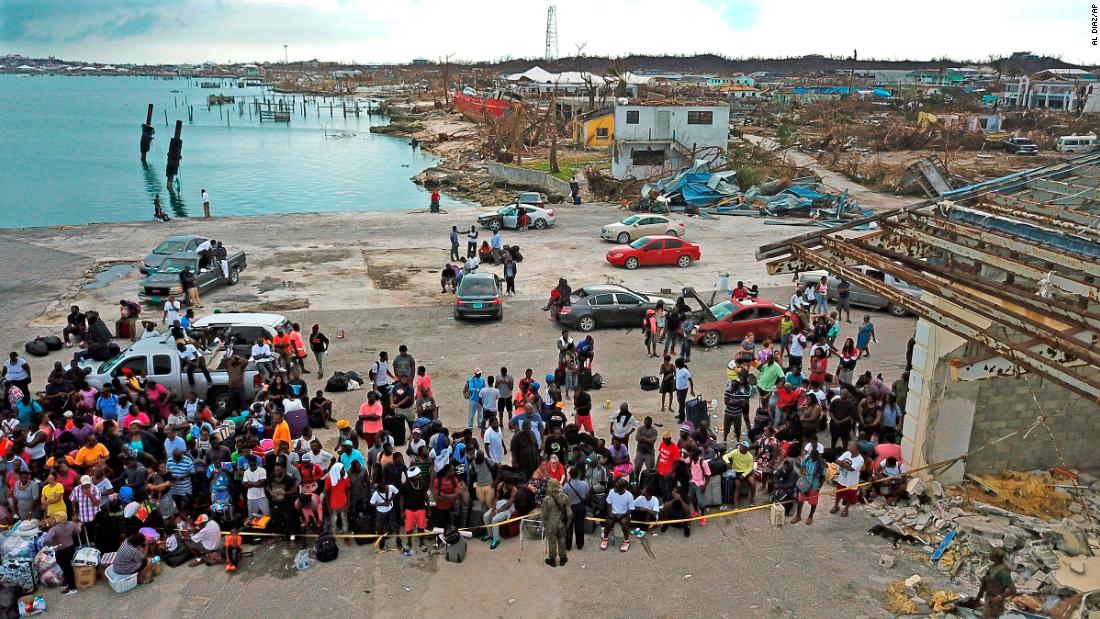[ad_1]
US rescue teams have been searching for survivors across the islands. And many Bahamas residents have fled to the United States since the storm hit.
“There’s some confusion there,” acting CBP chief Mark Morgan said Monday. “We will accept anyone on humanitarian reasons that needs to come here. We’re going to process them expeditedly.”
“We have to be very careful,” he said.
This much is clear: The situation on the ground in the Bahamas remains chaotic, and tens of thousands of people need help.
Here’s a look at how the US government has responded to migrants fleeing countries where disaster struck in recent years, and what could happen next.
Migrants from Haiti and El Salvador were protected in the US after disasters
In the past, the US government has stepped up the protections it offers migrants after natural disasters hit.
“If the government wants to help people to come for short stays as a reprieve, it certainly has the authority to do that,” said Muzaffar Chishti, director of the Migration Policy Institute’s New York office.
Whether the US government will offer more protections for the Bahamas, where Dorian left an estimated 70,000 people homeless, remains to be seen, Chishti said.
“Fearing the numbers may be large and overwhelming,” he said, “they may choose not to do that.”
“That was a very quick reaction in recognition of what had happened in Haiti, and it did help a lot of people,” Chishti said.
Trump says everyone needs ‘proper documentation’
But Trump sounded less than enthused when asked whether he was prepared to offer TPS to people from the Bahamas.
“We’re talking to a lot of different people on that,” the President said, noting that parts of the United States are also recovering from the hurricane, even though damage was not as bad as feared.
“We have to be very careful. Everybody needs totally proper documentation, because, look, the Bahamas had some tremendous problems with people going to the Bahamas that weren’t supposed to be there,” he said. “I don’t want to allow people that weren’t supposed to be in the Bahamas to go to the United States, including some very bad people and some very bad gang members and some very very bad drug dealers. So we are going to be very very strong on that.”
Trump didn’t provide further details. Officials in the Bahamas have cracked down on illegal immigration in recent years.
For Bahamians, several options could be on the table
Chishti said the US government could be weighing a range of different options as the number of residents trying to leave the Bahamas grows. Among them:
• TPS – As it has with other countries in the past, the United States could designate the Bahamas for TPS. But Chishti notes there are limitations to such protections. TPS, he said, “applies only to people who are already in the United States.”
• Humanitarian parole – For people who aren’t already in the United States and are fleeing the storm’s devastation, but don’t have valid visas to enter the country, the Department of Homeland Security could encourage officers to grant what’s known as humanitarian parole, Chishti said.
“There would have to be a guidance issued by the DHS that we are authorizing issuing of a parole for this group of people and in these circumstances,” he said.
• Regional response – It’s possible the United States will argue it’s not the only country that should be responsible for helping displaced people in the Bahamas.
“The US could, I think, argue that this is not just the US’s responsibility,” Chishti said, “that this is a real disaster that requires a cohesive, regional response.”
CNN’s Christina Maxouris, Eric Levenson, Paula Newton and Rosa Flores contributed to this report.
[ad_2]
Source link




